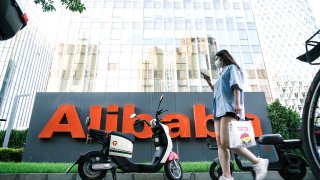
- Alibaba reported fiscal first-quarter earnings on Thursday that beat expectations, sending shares higher.
- In the quarter, Alibaba faced a number of headwinds including a resurgence of Covid in China that led to major cities being locked down and a sluggish Chinese economy in the second quarter.
Alibaba reported fiscal first-quarter earnings on Thursday that beat expectations, sending its stock higher.
The Chinese e-commerce giant's U.S.-listed shares jumped as much as 6% and closed the session 1.8% higher.
We're making it easier for you to find stories that matter with our new newsletter — The 4Front. Sign up here and get news that is important for you to your inbox.
Here's how Alibaba did in its fiscal first quarter, versus Refinitiv consensus estimates:
- Revenue: 205.55 billion Chinese yuan ($30.68 billion) vs. 203.19 billion yuan expected, remaining flat year-on-year.
- Earnings per American depositary share (ADS): 11.73 yuan vs. 10.39 yuan expected, down 29% year-on-year.
- Net income: 22.73 billion yuan vs. 18.72 billion yuan expected.
Despite Alibaba beating estimates, it is the first time the company posted flat growth in its history.
Money Report
In the quarter, Alibaba faced a number of headwinds including a resurgence of Covid in China that led to major cities, such as the financial metropolis of Shanghai, being locked down. That led to a sluggish Chinese economy in the second quarter of the year.
However, as cities came out of lockdown in late May and early June, growth started to pick up.
"Following a relatively slow April and May, we saw signs of recovery across our businesses in June," Daniel Zhang, CEO of Alibaba, said in a press release.
Meanwhile, the e-commerce giant continues to face a strict regulatory environment after Beijing's more than a year-and-a-half crackdown on the domestic technology sector.
While Alibaba had a tough quarter, analysts are expecting growth to pick up in the coming months.
China e-commerce in focus
Revenue from Alibaba's biggest business, the China commerce division which includes its popular marketplace Taobao, declined 1% year on year to 141.93 billion yuan. That was mainly due to a 10% fall in customer management revenue. CMR is revenue Alibaba gets from services such as marketing that the company sells to merchants on its Taobao and Tmall e-commerce platforms.
Alibaba said CMR decreased because the overall sales of online physical goods on its Taobao and Tmall platforms declined "mid-single-digit year-over-year" and there were increased order cancellations due to the impact of the Covid resurgence and "restrictions that resulted in supply chain and logistics disruptions in April and most of May."
In June, Alibaba said it saw a recovery in so-called gross merchandise volume (GMV) thanks to improving logistics and the annual 6.18 shopping festival in China, which culminates in June. GMV is a measure of the sales transacted across Alibaba's platforms but does not directly equate to revenue. The shopping event sees e-commerce players offer massive discounts to customers.
Under its China commerce business, Alibaba has also been trying to expand revenue and users for its discounting platform called Taobao Deals and grocery and fresh food service Taocaicai. The Hangzhou-headquartered company sees these newer businesses as a way to attract less affluent customers in smaller Chinese cities.
Investors have been watching if Alibaba can keep its costs under control while growing these businesses. Alibaba said Taobao Deals "significantly narrowed losses year-over-year as well as quarter-over-quarter driven by optimizing spending in user acquisition as well as improving average spending of active consumers." The company did not reveal the losses for Taobao Deals.
Alibaba said in the June quarter, Taocaicai GMV grew at more than 200% year over year while its losses "increased moderately compared to the same quarter last year."
Toby Xu, Alibaba's finance chief, said during a call with analysts that the company will continue to focus on "cost optimization and cost control" in the coming quarters. Xu said Alibaba is trying to find a balance between controlling costs and continuing to make "important investments" for long-term growth.
Cloud slowdown
While cloud computing is just 9% of Alibaba's overall revenue, it is seen as an important part of the company's future growth and profitability.
Alibaba posted cloud computing revenue of 17.68 billion yuan in the June quarter, up 10% year on year. But that was a slowdown from the 12% year-on-year revenue growth seen in the March quarter and the 29% rise seen in the same period last year.
The company's cloud division has been hurt by the loss of a major customer as well as the Chinese government's crackdown on industries such as online education that were using Alibaba's products.
But Alibaba said the rise in cloud revenue reflects the "recovering growth of overall non-Internet industries, driven by financial services, public services, and telecommunication industries."






